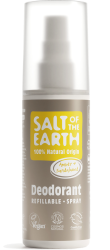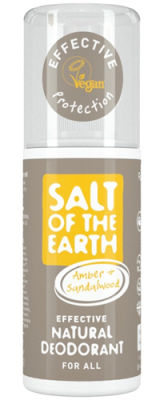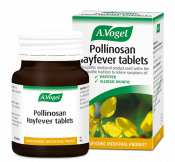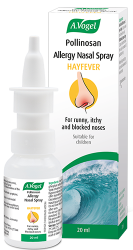What could be causing allergies in my house?
Do your allergies flare-up in the home? A few potential sources of irritants that can be found indoors are:
- Aquariums
- Fireplaces
- House plants
- Vacuum cleaners
- Household cleaners and air fresheners
- Fresh air
- Toiletries
Let's find out more about why these pose issues for allergy sufferers.
|
Firstly - What is an allergen? An allergen is anything that your body reacts to as if it's poisoning you – even if it's totally harmless. |
1. Aquariums
A tank of clean-looking water with dander-free fish – what's there to get itchy about?
Although this may look innocuous, a fish tank can harbour mould. This is an allergen but can act also as a respiratory irritant. Any part of the tank that is damp will encourage the growth of microorganisms. Any fish food that missed the tank and is left lying on tabletops or on the floor can also act as dust mite bait.
TIP - Deter these perils by cleaning your fish tank regularly and dry any outside damp bits every day. Sweep up any flakes of fish food immediately.
2. Fireplaces
Who doesn't love an open fire or a wood-burning stove? So cosy. Unfortunately, though, this is another example of something that can worsen allergies1.
Smoke from the open flames can contain very small particles of matter. They can become airborne and get into your eyes, up your nose and into your lungs. When the particles are less than 10 micrometres in diameter, they can cause many problems. The lungs can be affected, for example, and you may even be more likely to develop bronchitis.
Wood smoke can also contain many toxic substances like methane and even formaldehyde. Formaldehyde is known as a volatile organic chemical (VOC). This means that it can turn into a gas at a very low temperature. The word organic in this phrase just means that a VOC may be a naturally-occurring chemical rather than man-made.
TIP - If you do have a stove, make sure that it is correctly sealed. The chimney flue should be swept every year and the room properly ventilated. Wood fuel should be dry and seasoned. Do not burn waste wood or household rubbish. Try to avoid coal, which is the devil and an environmental no-no.
3. House plants
Indoor plants are often bought to purify indoor air. They can, however, be a problem for allergy sufferers as some house plants produce pollen. Orchids, spider plants or anything with a flower, in fact. Even big-leafed plants like palm can be an issue if they are a male plant. Another example of female superiority (joke).
Another issue is that the soil in your potted plant can support mould. This can happen if the soil is over-moist from top-watering. Keep your plant in a well-ventilated sunny spot to avoid this and don't overwater.
Also, remember to wipe down your plants with a damp cloth regularly. Dust can accumulate on plants as easily as on a picture frame. Don't, however, use artificial waxes, cleaning or glossing formulas on your plants – they may make the plants look shiny, but may not be quite as clever for your nostrils.
TIP - Buy plants with big leaves and no flowers. Lady palms and bamboo will remove impurities from your air without dispersing pollen.
4. Vacuum cleaner
We hoover to remove dust, pollen and other small particles. If the machine is spewing the stuff back into the air again, however, then there is no benefit at all.
This can happen if the machine is ancient or if the filter is blocked or inadequate. To help allergies, you need a small particle or high-efficiency particulate (HEPA) filter.
TIP - Google how to clean your vacuum cleaner and keep the filter unblocked. Wear a facemask while doing this dirty job.
5. Household cleaners and air fresheners
House-cleaning is essential for the control of allergies. Take care when choosing your cleaning products, though, as chemical cleaners can contain many harmful substances.
These can irritate the skin and inflame our airways. Formaldehyde, ammonia and sodium hypochlorite are particularly harmful to the lungs if inhaled.
Air fresheners and many artificial scents are made with VOCs. Them again! VOCs are known irritants and have been linked to allergic and immune effects in children2.
TIP - Essential oils are beautiful natural scents, much nicer than an artificial air freshener. My car smells amazing: like a fancy spa. My secret - I put a couple of drops of peppermint and patchouli on a tissue in the ashtray thing. Bicarbonate of soda and distilled vinegar are great natural cleaning agents. There are also many good brands of ready-made products.
6. Fresh air
Opening the window and letting in some fresh air should be good for you. Circulating air will ventilate the room and remove bad odours. It should also prevent dampness that would encourage mould.
This may not be the case if you live by a busy road or building site, though. Fumes, dust and pollutants contain small particles and heavy metals that can be harmful. Nitrogen dioxide and fine particulate matter from traffic fumes are dangerous for asthma sufferers3. Building sites may generate dust and many compounds that are harmful to inhale such as dust, mould and even asbestos.
TIP - If you are living in an area with a lot of fumes and air pollution, it may be better to keep your windows closed. Use an air filter with a HEPA filter to purify the air instead. A dehumidifier can be used to dry out damp rooms with humidity in the air. Make sure that any equipment like this is well-maintained and cleaned regularly.
7. Toiletries
The skin is our biggest organ. Its design protects us from damage as well as keeping our wobbly bits inside. It also needs to be able to absorb in order to manufacture vitamin D from sunlight. The downside of this is that harmful substances can be absorbed through our skin.
Up to 60% of anything we put on our skin is absorbed. This is an issue as skincare products can contain chemicals that can weaken or irritate the skin. The wrong product can strip the skin of its protective barrier - a layer of oils and good microorganisms.
Other products may even cause an allergic reaction. Creams, soaps and lotions that contain artificial perfume are particular culprits. Sodium lauryl sulfate, parabens, and aluminium are examples of ingredients to be wary of.
TIP - Use skincare products that use good quality natural and organic ingredients. There will be many options available in your local health food shop or pharmacy.
I recommend crystal spring deodorant which is unscented and aluminium-free. It comes in spray, roll-on and stick. There is a lovely range of natural scents too.
Bioforce Cream is also a good all-rounder with an ointment like texture. I use this in my house as an 'everything remedy': chapped skin, lips, beard rash and cracked knuckles. It's good around your nose if you are trying to avoid dust or pollen getting in, and if your nose is sore from blowing it all the time.
References:
1 https://www.ncbi.nlm.nih.gov/pmc/articles/PMC2760246/
2 https://www.ncbi.nlm.nih.gov/pubmed/17661923
3 https://www.healthylondon.org/asthma-and-air-pollution-avoid-it-where-you-can-and-stay-safe-by-planning-your-preventative-medication/







 Looking for a natural deodorant? Well, look no further than Salt of the Earth!
Looking for a natural deodorant? Well, look no further than Salt of the Earth!


